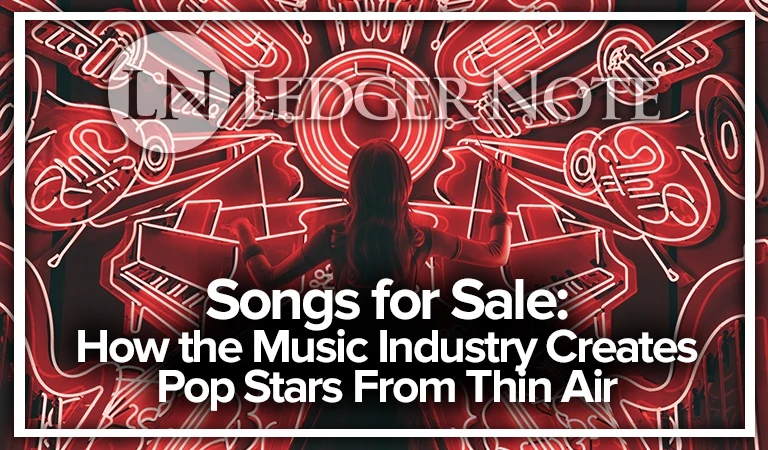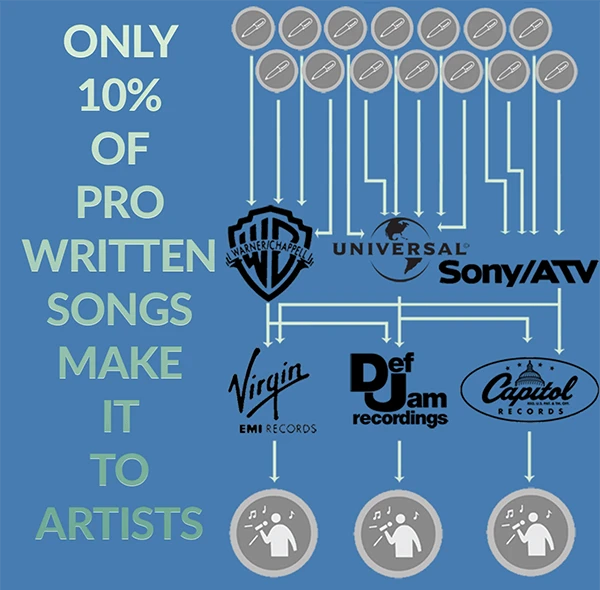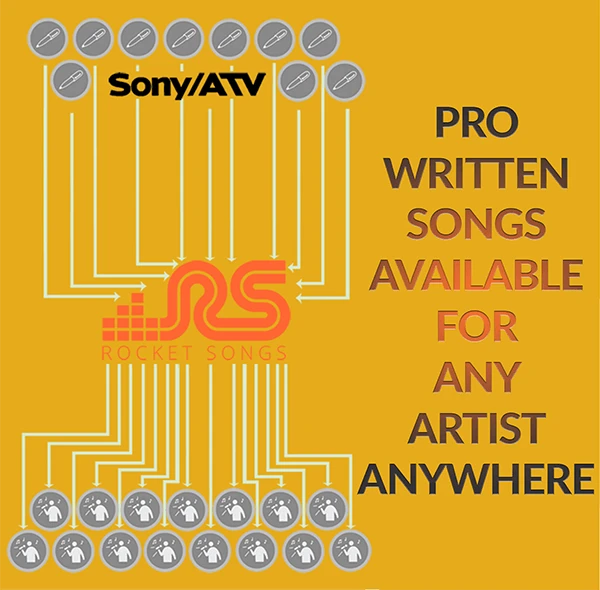
This isn’t news to the old-timers. We remember the days when artists all covered each other’s songs and wrote for one another. The thing is, they were all capable and proved it time and again. That’s not the case today.
And it seems the big wigs would like to sweep that little secret under the rug. People are becoming wise to the game though.
There’s even conspiracies floating around that there’s only one person writing all of the biggest hit songs. That’s closer to the truth that you’d imagine, but there’s also a treasure trove of untapped masterpieces out there that are starting to be released from the vaults.
Hundreds of thousands of songs have been hidden away under lock and key never to be heard, but the internet, as always, has opened up the floodgates for us “normal people.”
Let’s take a walk through the history of how the big labels have churned out cookie cutter pop stars one after another, transforming artists no better than the rest of us (and arguably worse, but prettier) into gigantic stars.
We’ll start with the current conundrum and how the internet has created a new problem and solved it by presenting new opportunities for artists and songwriters.
Then we’ll slide into the history of how we found ourselves in this situation and how new music industry tech start-ups are solving the problem (and uncovering countless potential #1 chart toppers anyone can get their hands on).
How the Internet Changed the Demand for Songs
On any given day, there’s a pretty good chance that somebody is writing an article, creating a video or blogging about how today’s music business is hit driven. It’s an overused trope, but it is very true. There’s as much of this content as there are songs for sale.
Gone are the days of record releases with carefully sequenced album cuts. Now, it’s all about getting your songs onto playlists and watching the repeat streams tick up and up. Album sales have plummeted by 80% in the past ten years.
The music industry is now a single driven business again. When we were buying CD’s, they’d give us about three quality hit songs and the rest of the album was filler. But these days almost every song needs to be a hit or you’re burning up your marketing budget and energy.
You must have a great song to reach the public and convert them into fans, otherwise it gets no traction and is forgotten. To create a brand as well as the momentum that leads to touring and robust merchandise sales, you need a hit song. It’s repetitive, but that’s the musical landscape today.
Great Songs Exist, But Good Luck Getting One
If you’re one of the few that knows music theory, can write lyrics that emotionally touches broad audiences, can bridge the two together while arranging and orchestrating them into a full package, and then perform it yourself… congratulations, you are the rare, elusive singer-songwriter!
Everyone else buys songs. That may seem weird at first, but yes, there are songs for sale and you can’t have them. We’re simplifying (barely) how it works, but hit songs generally come from one of two places:
- Inside – This refers to the artist themselves and/or their producer or songwriting partner.
- Outside – This refers to songs written by another songwriter not associated with the artist’s team.
Everyone knows about this when it comes to rap. Usually, the rapper buys a beat and then writes lyrics over the instrumental. Sometimes another wrapper even ghostwrites the lyrics.
Dr. Dre doesn’t write lyrics, for instance, but at the same time sells beats. He’s even had people ghost-produce beats under his name. That’s how wild this gets.
There’s good news for those of us who are great performers but can’t write a song to save our lives. Good songwriters are non-stop being paid to write songs, so there’s a constant supply of top-quality songs always being produced.
The bad news is that access to the best outside songs has, until now, been heavily controlled. You needed a manager, an A&R person, or lawyer who has the contacts and savvy to find the right outside song for the right artist heading into the studio. There is a skill in matching songs to artists.
A classic mistake is the hit song “Umbrella,” performed by Rihanna. They let Jay-Z rap a short intro, filmed a video, and we haven’t heard the end of Rihanna since. This song was originally written for and shopped to Britney Spears and her team, who ended up turning it down. Big mistake!
For the emerging indie artist, this is a daunting task. We don’t have these kind of connections, infrastructure, or budget. And it’s designed that way to block you out from the industry.
They limit the number of artists in the spotlights so the revenue is more concentrated. It’s all about controlling the pie so you can’t have a slice.
Well, then the internet was invented and that’s backfiring gloriously.
Outside Songs & The Bob Dylan Effect
We now take a brief diversion into history and the story behind the outside song (also known as songs for sale).
For decades the best and most popular singers made their name singing songs other people wrote. From Blues musicians who turned church and spiritual songs into their own open chord masterpieces to Frank Sinatra and Billie Holiday who used their masterful voices, phrasing, and timing to create vocal and Jazz classics.
But then, rising from the Folk Music circuit, came Bob Dylan and the cult of the singer-songwriter. Starting with Dylan’s rise to prominence, audiences and the music industry came to focus on the lone entity who can write and record his/her own songs.
As time progressed we were blessed with the likes of John Denver, James Taylor, and Joni Mitchell. Not only did these masters perfect the pop song but they even introduced new song structures into our musical vocabulary.
This shift produced wonderful, heartfelt songs and some really great artists, but upon reflection it was never as total as it first appeared. The outside song has still been a vital part of the music world.
“Classic” artists like Willie Nelson, Bob Marley, and Rod Stewart recorded and benefited from outside songs. Contemporary artists like Wilco, Ariana Grande, and Blake Shelton do so in the present day.
And now with the TV show Songland, the spotlight is starting to fall on songwriters like Ed Sheeran and Max Martin… the outside song is back. But the best outside songs are only back for a select few: those with those connections.
Why is it this way? Well that demands a deep dive into the relationship and economy of songs and artists.
So Much Songwriting Work & Talent Goes to Waste
Welcome to the music business! The side of this economy we’re concerned with is the songs.
Traditionally, the song is the currency of music publishing houses who pay advances to the best songwriters in exchange for a portion of the publishing rights of these songs and the sole ability to shop them them to labels and their signed artists.
These publishing companies not only pay advances, but also work with the songwriter to hone the songs and develop them into masters or stem tracks of the highest quality possible.
Once finished, through one way or another, these songs are routed to record labels and music managers with the target hopefully being a high-profile musical artist. Many of these songs are written with specific artists in mind.
If the target is interested, the song is generally licensed or bought out for tens, if not hundreds of thousands of dollars.

Just think about how inefficient this is. Vast resources are put into the creation of a bunch of songs: the songwriters’ time, energy and skill; the time of those who work for the music publisher; the money, studying, and coaching…
And then we still have the work that goes on in the recording studio, the time and efforts of studio musicians, the mixer, the producer, and the mastering engineer. All that work for a handful of sales.
These sales admittedly lead to millions of dollars in revenue thanks to how this process is locked down in complication and high prices. (Still no sight of the little guy!)
But it’s not over. Then these demos are taken by the publishing company and a select few artists get to hear them. And of those select few only one or two will actually take a professionally written song and record it.
The rest of these pre-written songs for sale? They’re owned and stored in the digital vaults of Sony-ATV, Warner Chappell, and other companies like that. These songs are never heard again. They may be hits, but the target didn’t like it so whatever. Throw it in the vault and forget about it.
Music Publishing companies only convert, on average, 20% of their catalogs into recorded songs. The rest of these songs for sale are gone, locked up in a vault, and off the market.
So, if you don’t have a contract with the right people, or have a well-connected lawyer or manager, your chances of ever getting access to one of these great songs is (well, has been) pretty much nil.
As Blake Shelton famously once said in an interview with Rolling Stone:
Rolling Stone comments, “You wrote more for this album than any other. But songwriting has never seemed like a huge priority for you.”
Blake Shelton responds, “I’m not the biggest fan of my own writing. I’m really hard on it, for two reasons. I think when you’re an artist in my position, I have the opportunity to get my hands on some of the greatest songs written, because I know all these incredible writers in Nashville.”
Blake continues, “How foolish would it be not to take advantage of that? We’re talking about some of the best writers in the world. I want to make the best album I can humanly, possibly make. Why wouldn’t I take advantage of that? I don’t need a part in the publishing. I just want my record to be good.”
So, How Has Access to These Songs for Sale Changed?
What is an artist to do if they’re a great performer but need great songs to match their energy? All is not lost. Being a musician is still, despite all of the above, a pretty wonderful gig.
Nearly 100% of musicians are people doing what they love, who have a remarkable amount of skill and facility, and have a chance to impact the lives (and ears) of millions of fans. The starving artist part sucks, to be honest, but a new path has opened towards the light at the end of the tunnel.
A hit song is important, it can be found. It can be recorded and it can be released. There are three ways of getting this done:
Option 1 – You can write the song yourself. Becoming the writer of a hit song is hard. But we all know what it takes. It takes years of practice, of community, of rehearsal, and of failure. But it is doable. How do you start down this path?
By writing of course. Start writing melodies, lyrics, and rhythms. Listen to other people’s songs and song structures, talk to fellow musicians, frequent online communities, and grow your knowledge base. Nothing can replace hard work… except money.
Option 2 – You can get into the existing musical ecosystem. Get onto the roster of a connected music-manager, get signed to a successful indie or major record label, and/or network your way into the right social circles.
Just because the best songs are limited to a select few doesn’t mean you can’t be part of that select few. Sure, it helps if you are in New York City, Los Angeles, or Nashville. Pounding the pavement and pressing the flesh has worked for nearly a century in this business and it won’t stop working anytime soon.
Option 3 – You can ride the digital democratization wave. New music-tech start-ups are making it easier and easier to get access to services and resources that were previously unavailable. You can get hooked up with a professional session producer or musician via the myriad of online professional service marketplaces.
You can have a mastering engineer master your songs from a distance. You don’t even need a record label for online music distribution to get your songs onto Spotify or Apple Music.

All of these services and relationships are easier and cheaper. And this democratization even extends into the original song space where online marketplaces like RocketSongs are creating opportunity for musicians across the globe to get their hands on a high-quality, professionally written song.
The same kind of song that Frank Sinatra, Beyoncé, or Christina Aguilera used to to fill out their set, playlist, or any other musical project they had is now available to everyone.
Now Everyone Has Access to the Songs for Sale
The original song is a song written by somebody other than the singer and his/her immediate team. This has long been an important part of the music publishing and music recording business, but for a variety of reasons the degree of importance has changed. Some of these reasons include:
- Access being intentionally limited to only the “connected”
- Bob Dylan and the myth of the singer-songwriter
- Cost, with traditional buyouts ranging into six figure deals
But now, on the backs of artists like Blake Shelton, Katy Perry, and many others, and with the ascendancy of NBC’s Songland the original song is enjoying a renaissance. Many artists may prefer to write their own, but for those looking to get access to a top quality song written by a pro, here is what you can do:
- Work to establish your connections with lawyers, managers, and fellow artists.
- Get signed to a major or top indie record label who will buy songs for you.
- Try some of the new online marketplaces that offer great selection for a reasonable price.
If you can pony up the budget, you can bypass all of the troubles and annoyances of bothering to learn how to write a song and meeting the right people who act like they don’t have the time of day for you.
Shortcutting the process with companies like RocketSongs and others is the way to go in your early days while you’re releasing your first albums and building a fan base. The songs are for sale if you’re serious about your career.